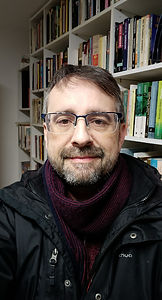




10 a.m. to 12 p.m.
ROUND TABLE 02
NETWORKS AND FLOWS: A METHODOLOGICAL, SOCIAL AND FINANCIAL ANALYSIS OF EMPIRE BRAZIL
Coordinator: Prof. Dr. Vitória Schettini (Universo/FASM)
%2019_24_53_591455f0.jpg)
Social networks and historical analysis:
methodological reflections
%2021_28_23_0a6e650e.jpg)
Prof. Dr. Mateus Rezende
de Andrade
(UFJF)
Professor in the Department of History and the Graduate Program in History at the Federal University of Juiz de Fora. Researcher at the Laboratory of Economic and Social History (LAHES/UFJF). He holds a bachelor's degree in History from the Federal University of Viçosa (2012), a master's degree in History from the Federal University of Minas Gerais (2014), and a doctorate in History from the Federal University of Minas Gerais (2018). He was an associate researcher in a postdoctoral internship at the Department of History, College of Arts, University of Guelph, Canada. He worked as a historian for the Intangible Heritage Management and Protection and Memory Directorate of the State Institute of Historical and Artistic Heritage of Minas Gerais. At the Institute of Continuing Education of the Pontifical Catholic University of Minas Gerais, he was a professor in the area of Heritage and Historical Archives in Minas Gerais. He is a researcher with an emphasis on history, working mainly on the following topics: historical sociology; economics and population; historical demography; family history; slave societies; social network analysis; social mobility; hierarchies and inequalities; historical geography; and history of space.
Networks, cronyism and social hierarchy on the southern border of slave-owning Brazil (19th century)
%2018_20_09_8c188741.jpg)
Prof. Dr. Luis Augusto
Farinatti
(UFSM)
Associate Professor in the Department and Graduate Program in History at the Federal University of Santa Maria (UFSM). He holds a PhD in Social History from the Federal University of Rio de Janeiro (UFRJ) with a doctoral internship at the École des Hautes Études en Sciences Sociales (EHESS) in Paris, France. He holds a master's degree in Brazilian History from PUCRS and bachelor's degrees in History and Law from UFSM. He was Coordinator of the Graduate Program in History at UFSM (2017-2019). He was a visiting professor at the University of Buenos Aires, the École des Hautes Études en Sciences Sociales, and the National University of Mar del Plata. He is a member of the advisory board of the Revista Brasileira de História (RBH-ANPUH) and the Revista História UNISINOS. He conducts research on the history of Brazil in the 19th century, focusing mainly on the following topics: agrarian history, social hierarchies, family history, frontiers, and urban history.
Continuous set of numerous springs:
finances, infrastructure and postal flows in Brazil,
c. 1850 - 1865
%2011_13_18_3a65bce2.jpg)
Prof.ª Dr.ª Pérola Goldfeder
(UNIFESP/UEMG)
He holds a PhD in Economic History from the University of São Paulo - USP (2021), a master's degree in History from the Federal University of Ouro Preto - UFOP (2012), and a bachelor's degree in History from the Pontifical Catholic University of Minas Gerais - PUC Minas (2008). In 2018, she completed a research internship abroad (sandwich) at Columbia University (New York, USA) with funding from FAPESP (project 2018/03712-5). She won the 2021 National Research Archive Award with her monograph entitled “Around the Throne: the political economy of postal communications in 19th-century Brazil.” She is currently a professor in the History Departments at the Federal University of Ouro Preto (UFOP) and the State University of Minas Gerais (UEMG), Campanha Campus. She has experience in the field of History, with an emphasis on Economic History and History of Communications, working mainly on the following topics: globalization of postal communications in the Long 19th Century; infrastructure and communication and transportation flows; formation of the bureaucracy and the Brazilian constitutional monarchy.